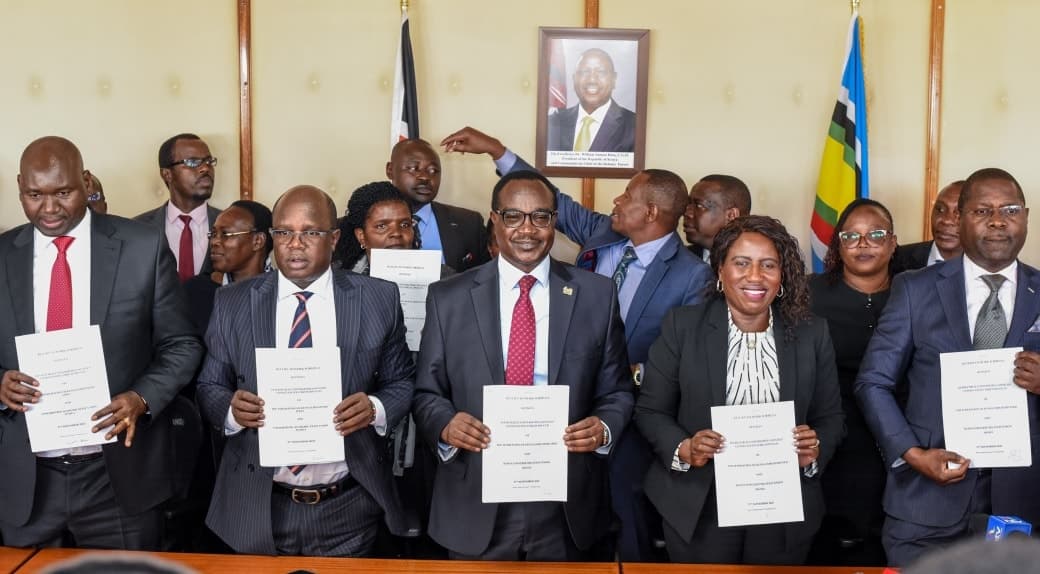We're loading the full news article for you. This includes the article content, images, author information, and related articles.
Academic activities in public universities are set to resume after lecturers' unions signed a return-to-work formula with the government, securing payment of long-disputed arrears and paving the way for new contract negotiations.

Lecturers and non-teaching staff in public universities have officially called off their 49-day strike after signing a pivotal agreement with the government on Wednesday, November 5, 2025. The industrial action, which commenced on September 17, had paralysed learning for over 600,000 students across the country.
The breakthrough came after extensive negotiations culminating in a return-to-work formula signed at Jogoo House, Nairobi. The deal was brokered between the government and the unions, including the Universities Academic Staff Union (UASU), the Kenya Universities Staff Union (KUSU), and the Kenya Union of Domestic, Hotels, Educational Institutions, Hospitals and Allied Workers (KUDHEIHA).
At the heart of the dispute was the government's failure to fully implement the 2017–2021 Collective Bargaining Agreement (CBA), which left lecturers owed KSh7.9 billion in salary arrears. Education Cabinet Secretary Julius Ogamba and UASU Secretary-General Constantine Wasonga presided over the signing ceremony, marking a formal end to the protracted standoff.
Under the terms of the newly signed accord, the government has committed to paying the outstanding KSh7.9 billion in two phases. The first instalment of KSh3.88 billion is scheduled for disbursement between November and December 2025. The second and final tranche of the same amount is expected to be settled by July 2026.
Crucially, the agreement provides a framework for negotiating the 2025–2029 CBA, with both parties committing to conclude the talks within 30 days. This was a key demand from the unions, who had cited delays in the negotiation process as a major grievance.
Speaking to the press on Wednesday, Dr. Wasonga confirmed the union's acceptance of the deal. "We have agreed to be paid in two instalments... We are happy that we have secured the whole amount," he stated. He, however, issued a stern warning that the unions would not hesitate to call for another strike should the government fail to honour its side of the bargain.
The return-to-work formula also includes a non-victimisation clause, guaranteeing that no university staff will face disciplinary action for their participation in the industrial action. All show-cause letters and other disciplinary measures initiated during the strike are to be withdrawn unconditionally.
The end of the strike brings significant relief to students, parents, and the entire higher education sector in Kenya. Universities are now expected to recall students immediately and reorganise their academic calendars to compensate for the seven weeks of lost learning time. Dr. Wasonga apologised to students for the disruption but assured them that lecturers were committed to recovering the lost time.
The strike had been marked by intense back-and-forth between the unions and the Ministry of Education. At one point, lecturers had rejected a phased payment plan, insisting on a lump-sum settlement. The intervention of the National Assembly's Committee on Education, chaired by Tinderet MP Julius Melly, played a crucial role in breaking the deadlock.
Education CS Julius Ogamba welcomed the resolution, stating that it would restore stability in public universities. "The government remains committed to improving the welfare of university staff and ensuring quality education for all," Ogamba remarked on Wednesday. The focus now shifts to the implementation of the agreement and the forthcoming negotiations for the new CBA, which will be critical for ensuring long-term industrial harmony in Kenya's public universities.
Keep the conversation in one place—threads here stay linked to the story and in the forums.
Sign in to start a discussion
Start a conversation about this story and keep it linked here.
Other hot threads
E-sports and Gaming Community in Kenya
Active 9 months ago
The Role of Technology in Modern Agriculture (AgriTech)
Active 9 months ago
Popular Recreational Activities Across Counties
Active 9 months ago
Investing in Youth Sports Development Programs
Active 9 months ago
Key figures and persons of interest featured in this article